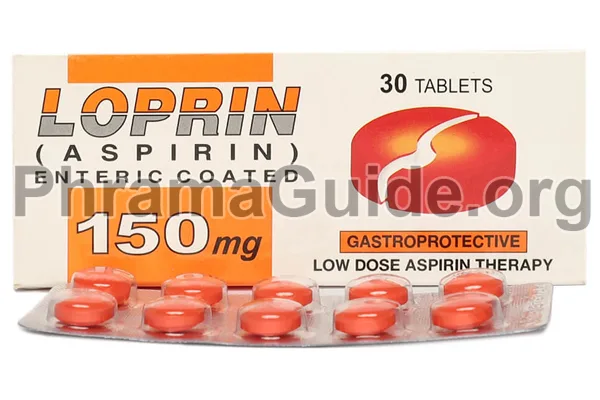Loprin a commonly used medication, can have various side effects. It’s important to note that not everyone will experience these side effects, and some individuals may be more sensitive to Loprin than others.

Adverse Effects of Loprin
Side effects of Loprin (aspirin) are generally mild and infrequent.
Blood and lymphatic system disorders
Loprin (aspirin) prolongs bleeding time, decreases platelet adhesiveness and, in large doses, may cause hypoprothrombinaemia. Thrombocytopenia may also occur. Bleeding disorders such as epistaxis, haematuria, purpura, ecchymoses, haemoptysis, gastrointestinal bleeding, haematoma and cerebral haemorrhage have occasionally been reported. Fatalities have occurred. Haemolytic anaemia can occur in patients with glucose-6-phosphate dehydrogenase (G6PD ) deficiency.
Immune system disorder
Hypersensitivity reactions include skin rashes, urticaria, angioedema, asthma, bronchospasm, rhinitis and rarely, anaphylaxis.
Ear & Labyrinth disorder: Tinnitus.
Gastrointestinal disorders
Gastrointestinal irritation is common in patients taking aspirin preparations, and nausea, vomiting dyspepsia, gastritis, gastrointestinal erosions and ulceration have been reported. Anaemia may occur following chronic gastrointestinal blood loss or acute haemorrhage.
Skin and subcutaneous tissue disorders
Skin reactions may occur in susceptible patients.
Renal and Urinary disorders: Urate kidney stones
Warnings and Precautions for Patients Using Loprin
Caution should be exercised in patients with allergic disease, impairment of hepatic or renal function (avoid if severe) and dehydration. Loprin (aspirin) may also precipitate bronchospasm or induce attacks of asthma in susceptible subjects. The elderly may be more susceptible to the toxic effects of salicylates. Continuous prolonged use of Loprin (aspirin) should be avoided in the elderly because of the risk of gastrointestinal bleeding. Caution should be taken in patients with glucose-6-phosphate dehydrogenase deficiency as haemolytic anaemia may occur. Aspirin may interfere with insulin and glucagon in diabetes. Aspirin prolongs bleeding time, mainly by inhibiting platelet aggregation and therefore it should be discontinued several days before scheduled surgical procedures. Haematological & haemorrhagic effects can occur and may be severe. Patients should report any unusual bleeding symptoms to their physician. There is a possible association between aspirin and Reye’s Syndrome when given to children. Reye’s syndrome is a very rare disease, which affects the brain and liver, and can be fatal. For this reason, aspirin should not be given to children aged under 16 years unless specifically indicated (e.g. for Kawasaki’s disease). Salicylates should not be used in patients with a history of coagulation abnormalities as they may also induce gastrointestinal haemorrhage, occasionally major. Aspirin should not be taken by patients with a stomach ulcer or a history of stomach ulcers. Before commencing long-term aspirin therapy for the management of cardiovascular or cerebrovascular disease patients should consult their doctor who can advise on the relative benefits versus the risks for the individual patient. Patients with hypertension should be carefully monitored.
What Are The Possible Drug Interactions of Loprin?
Anticoagulants
Loprin (Aspirin) may potentiate the effect of heparin and increase the risk of bleeding with oral anticoagulants, antiplatelet agents, and fibrinolytics. Concomitant use is not recommended.
Other non-steroidal anti-inflammatory drugs (NSAIDs)
Concurrent administration can increase side effects. Use of two or more NSAIDs increases the risk of gastrointestinal hemorrhage Experimental data suggest that ibuprofen may inhibit the effect of low-dose aspirin on platelet aggregation when they are dosed concomitantly. However, the limitations of these data and the uncertainties regarding the extrapolation of ex vivo data to the clinical situation imply that no firm conclusions can be made for regular ibuprofen use, and no clinically relevant effect is considered to be likely for occasional ibuprofen use.
Corticosteroids
The risk of gastrointestinal bleeding and ulceration is increased. Corticosteroids reduce the plasma salicylate concentration and salicylate toxicity may occur following withdrawal of corticosteroids.
Carbonic anhydrase inhibitors
Reduced excretion of acetazolamide; salicylate intoxication has occurred in patients on high-dose salicylate regimes and carbonic anhydrase inhibitors. Concurrent administration of carbonic anhydrase inhibitors such as acetazolamide and salicylates may result in severe acidosis and increased central nervous system toxicity.
Antacids and Adsorbents
The excretion of aspirin is increased in alkaline urine; kaolin possibly reduces absorption. Patients should be advised against ingesting antacids simultaneously to avoid premature drug release.
Mifepristone
The manufacturer of mifepristone recommends that aspirin should be avoided until eight to twelve days after mifepristone has been discontinued.
Antimetabolites
The activity of methotrexate may be markedly enhanced and its toxicity increased.
Antibacterials
The toxicity of sulfonamides may be increased.
Alcohol
Some of the effects of aspirin on the gastrointestinal tract are enhanced by alcohol.
Antiemetics
Metoclopramide enhances the effects of aspirin by increasing the rate of absorption.
ACE inhibitors
Aspirin may reduce the antihypertensive effect of ACE inhibitors.
Anti-epileptics
May enhance the effects of phenytoin and sodium valproate.
Diuretics
Antagonism of the diuretic effect of spironolactone.
Hypoglycaemic agents
Loprin (aspirin) may enhance the effects of insulin and oral hypoglycaemic agents.
Leukotriene antagonists
The plasma concentration of zafirlukst is increased.
Uricosurics
Effect of probenecid and sulfinpyrazone may be reduced.
Thyroid function tests: Aspirin may interfere with thyroid function tests.

Leave A Comment